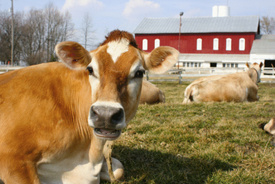Legal news for Pennsylvania product liability attorneys – Pasture Maid Creamery has had their license to sell raw milk suspended after reports of sick consumers.
PA Dept. of Health and Dept. of Agriculture say dairy farm raw milk contains unsafe bacteria.
New Castle, PA (www.NewYorkInjuryNews.com) – On Thursday, April 8, 2010, the Pennsylvania Department of Agriculture announced through a news release that it suspended Pasture Maid Creamery’s permit to sell raw milk for human consumption. The suspension was issued Monday, April 5, after testing found Campylobacter in raw milk samples.
According to the press release, the Department of Health recently received reports of consumers who became ill after drinking raw milk from the creamery. Samples were collected from the farm on March 26 and tested by the Department of Agriculture laboratory. These samples were the latest samples from the farm that were found to contain Campylobacter.
Pasture Maid Creamery, owned and operated by Adam Dean, sells raw milk directly to consumers. All consumers who purchased raw milk from the dairy from mid-March through the present are advised to immediately discard it. Even if frozen, Campylobacter may still contaminate the milk.
Raw milk is unpasteurized milk. Campylobacter is found in a wide array of healthy domestic and wild animals including cattle, pigs, sheep, goats, ducks, chickens and marine mammals. The bacteria is found in the intestines as part of the animal’s normal flora. It is shed in the animal’s feces. Most Campylobacter species do not cause any signs of illness in the animal host.
Human ingestion of Campylobacter bacteria causes diarrhea, nausea, vomiting, abdominal pain, headache and muscle pain. Symptoms will typically appear two to five days after exposure. Most cases of the infection are mild, but Campylobacter jejunti infection, or campylobacteriosis, can be severe and life-threatening. It can cause appendicitis, infect other organs or even enter the blood stream. An estimated one in 1,000 cases of Campylobacter infection results in death.
Additional information can be supplied through contacting the Pennsylvania Department of Health at (877) PA-HEALTH, or by visiting the organization’s website at wwww.health.state.pa.us.
Legal News Reporter: Tara Monks – Legal news for Pennsylvania product liability lawyers.







